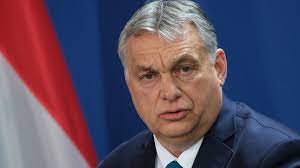Hungary - Rightwing nationalist PM Viktor Orban cruised to fourth landslide victory
Orban's party wins 135 out of 199 seats while opposition wins 63 seats
Six opposition parties had rallied their efforts to unseat Orban behind one candidate, Peter Márki-Zay. However, on polling day their support faltered and they proved no match for Fidesz which has secured another two-thirds majority in parliament.
With around 98% of votes tallied, Orban’s Fidesz-led coalition had won 53%, while a pro-European opposition coalition, United for Hungary, had just over 34%, according to the National Election Office. There is no big change in the turnout compare to the last parliamentary elections. The turnout was on the higher side at 68.69%. For the first time more than 200 international observers monitored the election in Hungary, an EU member, along with thousands of domestic volunteers from both camps.
The Ukraine
war played important role in the victory of Orban as his popularity increased
in last one month. Orban has benefitted from the "rally around the
flag", which sees voters favour incumbent political leaders at times of
international crises. Orban dramatically shifted the tone of his campaign after
Russia invaded Ukraine in late February, portraying the election as a choice
between peace and stability or war and chaos.
The
opposition called for Hungary to support Kyiv and act in unison with the
European Union and the military alliance NATO. But the main message carried on
pro-government media claimed the opposition wanted to drag Hungary into the
conflict.
Orban, a
longtime ally of Russian President Vladimir Putin, has insisted that Hungary
remain neutral and maintain its close economic ties with Moscow, including
continuing to import Russian gas and oil on favourable terms.
At his final
campaign rally Friday, Orban claimed that supplying Ukraine with weapons —
something that Hungary, alone among Ukraine’s EU neighbours, has refused to do
— would make the country a military target, and that sanctioning Russian energy
imports would cripple Hungary's own economy.
The results
show that Hungary is still divided politically. In the capital Budapest, the
six unified opposition parties won the biggest share of the vote. Fidesz
dominated elsewhere in the country.
The vast
majority of Hungary's opposition to Orban had unified behind one candidate --
Peter Márki-Zay -- in a bid to oust the country's long-term prime minister. Among
them was Jobbik, a once far-right party that has moved more mainstream in
recent years.
But support
for Jobbik -- whether because of this shift to the centre-ground or being in a
big-tent opposition diluted its impact -- dropped off on Sunday night. Voters
seem to have switched to Our Homeland Movement (MiHazánk), which came to
prominence during the pandemic as an anti-vaccine party. In a surprise result,
the party exceeded the 5% threshold to enter Hungary's parliament.
Khalid Bhatti













Post a Comment